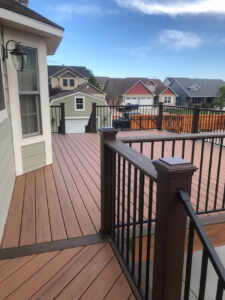Composite Decks vs. Wood Decks: Which is Better?
 When your home is in Colorado, you want to make the most of your outdoor living spaces. For many, that means a cool deck where you can have get-togethers, cookouts, and just relax as the sun sets behind the mountains. If you’re thinking about adding a new deck or replacing your existing deck, you might be surprised to see the new options that are available to you. While wood decks are still popular, many homeowners are turning to composite decks these days. So which is better?
When your home is in Colorado, you want to make the most of your outdoor living spaces. For many, that means a cool deck where you can have get-togethers, cookouts, and just relax as the sun sets behind the mountains. If you’re thinking about adding a new deck or replacing your existing deck, you might be surprised to see the new options that are available to you. While wood decks are still popular, many homeowners are turning to composite decks these days. So which is better?
What Type of Wood is Used for Decking?
Most often wood decks are made of natural woods like cedar, redwood, or tropical hardwoods. Sometimes the wood is pressure treated to last longer.
What is Composite Decking?
Composite decking is a blend of plastic film and wood fibers. The combination creates a very strong and resilient material.
Comparing Composite and Wood Decking
The only way to know which deck material is right for you is to compare the two side by side, so let’s take a look at how composite decking stacks up against natural wood in the categories that matter most.
3 Differences in Wood and Composite Decks
1. Appearance
People have loved the look of wood decks for decades and that will never change for some. Wood decks have a warm, natural appearance that fits the outdoors.
Composite decking may surprise you. Today’s composite decks come in a wide variety of styles and colors. You can get it with deep wood grain lines and stain to look much like your favorite wood. Or, if you prefer, you can opt for a color to set your outdoor living space apart from others in the neighborhood.
2. Durability
When buying a new deck, knowing how long it will last and the kind of maintenance required is a big consideration. A well maintained wood deck can last 20 years or more, but with less durability, requires more care.
Composite decking is made to endure. A quality composite deck requires very little maintenance and can actually look good and last up to 50 years. Invest in a composite deck, and your grandkids could be playing on it someday!
3. Cost
One of the benefits that wood has over composite decks is the initial investment. Wood decking usually has a lower cost to purchase than composites. However, annual upkeep in the years after ends up costing more than if you were to buy composite upfront.
With little cost afterwards, composite decking ends up making up the difference within 2-3 years. Of course the price differential always depends on the wood chosen, composite decking brand, and local market conditions.
Which is Right for You?
In the end, the choice between composite and wood decking comes down to your personal preference. Are you looking for a deck that will require minimal maintenance and lasts for decades? Composite decking outperforms wood and while it’s a bit more of an initial investment, over time you may come out ahead because of the maintenance costs involved with wood.
As long as you build a deck that fits your home and your lifestyle so you can enjoy your outdoor living, you can’t go wrong.
A Trusted Source for Composite Decks
If you want to learn more about the benefits of composite decks, contact Northern Lights Exteriors. We’d be happy to answer your questions and even help you custom design a deck for your Colorado home.


